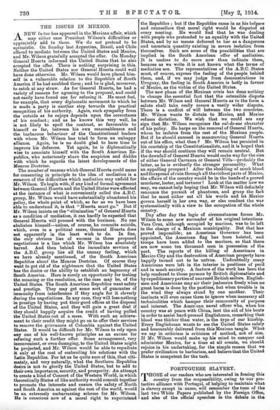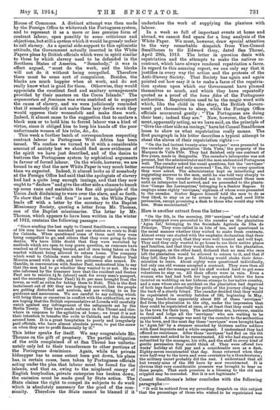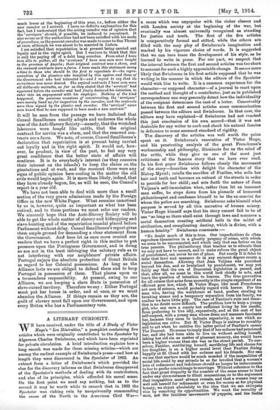PORTUGUESE SLAVERY.
THOSE of our readers who are interested in freeing this country from the responsibility, owing to our pro- tective alliance with Portugal, of helping to maintain what is slavery except in name, will remember the tone of the last two White Papers published by the Foreign. Office, and also of the official speeches in the debate in the House of Commons. A distinct attempt was then made by the Foreign Office to whitewash the Portuguese system, and to represent it as a more or less genuine form of contract labour, open possibly to some criticisms and objections, but still a system which it would be grossly unfair to call slavery. As a special side-support to this optimistic attitude, the Government actually inserted in the White Papers pleas by British officials which were in spirit similar to those by which slavery used to be defended in the Southern States of America. "Somebody," it was in effect argued, " must do the work, and the blacks will not do it without being compelled. Therefore there must be some sort of compulsion. Besides, the blacks are much happier when at work, and do not really know what is good for them. Otherwise, they would appreciate the excellent food and sanitary arrangements . provided by their masters on the Cocoa Islands." The argumendum ad fenzinain was even snatched at to support the cause of slavery, and we were judiciously reminded that if somebody did not make these lazy devils work they would oppress their womenfolk and make them. work. Indeed, it almost came to the suggestion that to enslave a black man or to hold him to forced labour was a kind of virtue, since it obliged him to keep his hands off the poor unfortunate women of his tribe, &c., &c.
, This week a further batch of correspondence respecting contract labour in Portuguese West Africa has been issued. We confess we turned to it with a considerable amount of anxiety lest we should find more evidences of the spirit we have just described, and of the desire to buttress the Portuguese system by sophistical arguments in favour of forced labour. On the whole, however, we are bound to say that the new White Paper is very much better than we expected. Indeed, it almost looks as if somebody at the Foreign Office had said that the apologists of slavery had had a quite long enough innings, and that they now ought to " declare " and give the other side a chance to knock p u some runs and maintain the fine old principle of the Union Jack disdaining to wave over the slave, and so forth. To show that the "old firm" is now in, the White Paper loads off with a letter by the secretary to the Baptist Missionary Society, quoting a letter from Mr. Thomas, one of the Baptist missionaries. The letter by Mr. Thomas, which appears to hare been written in the winter of 1912, contains the following passages
"Since sending the last reply to Consul Smallbones, a company of 104 men have been marched past our station en route to Noki for Cabinda. When questioned some of them said they were being compelled to go, and others that they were going to their deaths. We have little doubt that they were recruited by methods which are open to very grave question, as rumours have reached us of towns being burned, and of men being taken on the market without being allowed to return home. The company which went to Cabinda were under the charge of Senhor Paul Moreira armed with a rifle, and two policemen also armed. Dr. Gamble, in conversation with Senhor Paul. understood him to say that the men had to go whether they wanted to or not. He was also informed by the treasurer here that the resident and Senhor Paul are to receive fr. (about) each for every man's passport, and the secretary (Senhor Paul) 24 fr. per man brought from the towns, as well as extra for taking them to Noki. This is the first instalment out of 300 they are hoping to recruit, but the people are getting disturbed and anxious, and are writing to us for guidance and assurances. We are careful to say nothing which will bring them or ourselves in conflict with the authorities, as we are hoping that the British representative at Loanda will carefully watch against any infringement of the safeguards set by the Berlin Treaty. They have made reforms in San Thomd and else- where in response to the agitation at home; we trust it is not their intention to transfer the evils to Cabinda and the districts around here. It is a great temptation to poorly and irregularly paid officials, who have almost absolute power, to put the screw on when they are to profit financially by it."
This letter speaks for itself. We may congratulate Mr. Thomas on the gift of prophecy. The partial mitigation of the evils complained of at San Thome has unfortu- nately only led to their transference to other portions of the Portuguese dominions. Again, while the private kidnapper has to some extent been put down, his place has, in certain cases, been taken by Portuguese officials acting under the plea that labour must be found for the islands, and that as, owing to the misplaced energy of English busybodies, private enterprise has broken down, the omission must be made good by State action. The State claims the right to compel its subjects to do work which is absolutely necessary for the good of the com- munity. Therefore the State cannot be blamed if it
undertakes the work of supplying the planters with labour.
In a week so full of important events at home and abroad, we cannot find space for a long analysis of the White Paper. We must, however, draw special attention to the very remarkable despatch from Vice-Consul Smallhones to Sir Edward Grey, dated San Thoui, April 29th, 1913. The letter in question deals with repatriation and the attempts to make the natives re- contract, which have always rendered repatriation a farce. In regard to this amazing report, we can only say that it justifies in every way the action and the protests of the Anti-Slavery Society. That Society has again and again pointed out how easy it is to make a farce of the repatria- tion system upon which our Government have plumed themselves so much, and which they have repeatedly quoted as a proof of the bona fides of the Portuguese authorities. Repatriation used to be the magic word with which, like the child in the story, the British Govern- ment put themselves to sleep, while the Foreign Office officials murmured gently : " The Portuguese are doing their best ; indeed they are." Now, however, the Govern- ment, apparently acting, as we have said, on the principle of "Give the other side an innings," have let Consul Small bones loose to show us what repatriation really means. The first paragraph in his letter describes a typical attempt to cheat the slaves of their repatriation rights :— " On the 2nd instant twenty-nine 'servicees ' were presented to the curador on the plantation ' Bela Vista,' the property of the Marques de Valle FlOr. They had finished only one contract of five years, made in Benguella. The =radar's interpreter was not present, but the administrator said the men understood Portuguese well. The curador asked the usual questions, but the "servicaes ' seemed frightened and only answered ' Yes, Sir,' to every question they were asked. The administrator kept on interfering and suggesting answers to the men, until he was told very sharply to keep quiet. The curador decided not to recontract these men until an interpreter had arrived, and we proceeded to the planta- tion 'Campo due Laningeiras,' belonging to a Seabee Raposo. It employs some eighty .servicaes,' eighteen of whom were presented to the curador. Senhor Repose himself told the men to do as they liked, to stay on or to return to Angola, and used little persuasion, except promising a dash to those who would stay with him. None recontracted."
Here is another extract from the letter :— " On the 5th, in the morning, 389 'serviettes ' out of a total of 2,303 employed were presented to the condor on the plantation Ague Ise,' belonging to the Sociedado Agricola da Ilba do Principe. They were called in in lots of ten, and questioned in the usual manner whether they wished to make fresh contracts. Almost every one started with the emphatic declaration that their master was very good, that they were well treated and well kept. They said they only wanted to go home to see their native places and families, and that they would then return to the plantation. The manager, on the other hand, declared that no man who once left the plantation would be allowed to return to it, and that if they left, they left for good. Nothing would shake their deter- mination to leave. About eighty were questioned individually, but only one old woman accepted a contract. They were then all lined up, and the manager and his staff worked hard to get some volunteers to stay on. All their efforts were in vain. Even a woman who had had both her legs amputated below the knee insisted on wobbling on her hideous stumps to her native country. and a man whom also an accident on the plantation had deprived of both legs faced cheerfully the perils of the journey clinging to the back of a sturdy friend. The curador decided that they would be repatriated in monthly batches of 100, beginning in May. During lunch-time apparently about 200 of these ' servicaes fled from the plantation to the city, under the impression that they could be repatriated at once, or at least that they could wait in the town for their turn. The authorities are, however, unable to feed and lodge all the servicaes ' who are waiting to be repatriated. A message was sent by the minder to the authorities in the town, and the next day these servicaes' were brought back Apia Irk' by a steamer escorted by thirteen native soldiers with fixed bayonets and a white sergeant. I understand they had offered no resistance. After those • servicaes ' had fled on the 5th some came and asked to be recontracted. All who had stayed were submitted by the manager, his wife, and the staff to every kind of gentle persuasion they could think of. They were offered two weeks' holiday at fall pay and a considerable sum as a dash. Eighty-seven recontracted that day. Some returned when they
were half-way to the town and were overtaken by a thunderstorm; the military escort probably did the rest. I understand that all but twenty-nine of the 389 have by now recontracted. It is obvious that very considerable pressure was brought to bear on these people. That such pressure is a blessing to the old and crippled may be conceded. But it is not legitimate."
Consul Smallbones's letter concludes with the following paragraphs :—
"It will be noticed from my preceding despatch on this subject that the percentage of those who wished to be repatriated was much lower at the beginning of this year, i.e., before either the new cnrador or I arrived. I have no definite explanation for this fact, but I understand that the acting extruder was of opinion that the ,servicaes ' should, if possible, be induced to recontract. It also seems as if the authorities had not been satisfied with his mode of procedure, as the present ourador was made to come to San Thome at once, although he was about to be married in Lisbon.
I am satisfied that repatriation is at present being carried out loyally and in the right spirit. But I venture to think that this is only the paying off of a debt long overdue. Frain what I have been able to gather, all the servicaes' I have now seen were bought in the province of Angola; their original contract was a sham, and the renewed contracts were a farce. I have made this statement many a time to those who should be the first to repudiate it—the repre- sentatives of the planters who benefited by this system and those of the Government who had tolerated it—and I regret to say that its correctness was never denied. The expired contracts I have seen were alt deliberate untruths, as far as they stated that the • servieal' had appeared before the curador and had freely declared his intention to enter into an engagement with his employer. Nothing of the kind happened. On previous occasions of recontracting, the ' servicaes' were merely lined up for inspection by the eurador, and the contracts were then signed by the planter and curador. The servical' never even heard that he was supposed to have made a new contract."
It will be seen from the passage we have italicized that Consul Smallbones exactly adopts and endorses the whole case of the Anti-Slavery Society—namely, that the wretched labourers were bought like cattle, that the original contract for service was a sham, and that the renewed con- tracts are a farce. We note, of course, Consul Smallbones's declaration that repatriation is at present being carried out loyally and in the right spirit. It would not, how- ever, be prudent, in view of the past, to feel any very great confidence that the better state of affairs will continue. It is to everybody's interest (as they conceive their interest on the islands) to keep the slaves on the plantations and at work, and the moment there were any signs of public opinion here cooling in the matter the old evils would begin again. It is more than likely, indeed, that they have already begun, for, as will be seen, the Consul's report is a year old.
We have not been able to deal with more than a small section of the very grave admissions made by the Foreign Office in the new White Paper. What remains unnoticed by us is, however, quite as important as what has been noticed, and to these portions we must refer our readers. We sincerely hope that the Anti-Slavery Society will be able to get the whole matter of slavery and kidnapping and slave-hunting and of the repatriation scandal placed before Parliament without delay. Consul Smallbones's report gives them ample ground for demanding a clear statement from the Government. An& here let us once more remind our readers that we have a perfect right in this matter to put pressure upon the Portuguese Government, and in doing so are not in the least infringing the salutary rule as to not interfering with our neighbours' private affairs. Portugal enjoys the absolute protection of Great Britain in regard to her Colonial possessions. As long as the Alliance lasts we are obliged to defend them and to keep Portugal in possession of them. That places upon us a tremendous responsibility. At present, owing to our Alliance, we are keeping a slave State in possession of slave-cursed territory. Therefore we say : Either Portugal must put her house in order, and at once, or we must abandon the Alliance. If things remain as they are, the guilt of slavery must fall upon our Government, and upon every Briton who has a Parliamentary vote.
















































 Previous page
Previous page